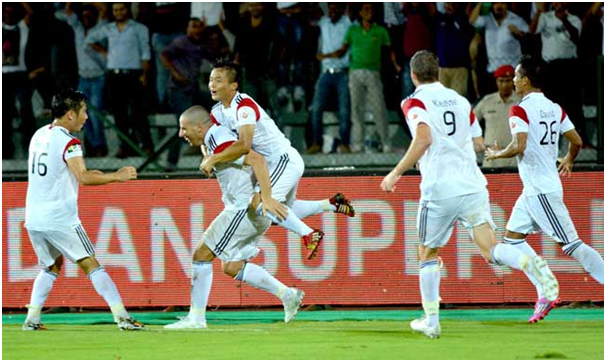We Are The 8, We Will Blow You Away!
Goal!

Through the human history of collective living, sports has always been an instrument that facilitated the establishment and deepening of a common identity. It has had its share in arousing feelings of togetherness not only in the West, but also in a country as diverse as India.
The inclusion of the NorthEast United Football Club (NEUFC) – a football team comprising of players from the eight North Eastern states- in the Indian Super League (ISL) is giving the region and its people a new sense of identity. Despite the massive cultural, linguistic, geographical and traditional differences that the region harbours, NEUFC has given it a platform wherein the 350 plus communities of the region can come together, celebrate, think and feel in a similar line- out in public, probably for the first time! The support that the team commands and the excitement it is arousing in the region speaks volumes of this.
Apart from exhibiting the talent that the region is a repository of, the football team has the potential to dilute the animosity between different communities of the region in the long run. While watching a match of the team a Thangkhul, a Meitei, a Karbi, a Dimasa, a Angami, a Khasi, a Mizo or an Apatani does not view it through the narrow lens of a tribal identity- an identity as something different (and often conflicting) from others- but as a team representing the whole of the region…a team in which they have an emotional stake.
It is in this context that the very name of the team NorthEast United has symbolic significance not being limited just to football. It sends a message of unity across the region, otherwise divided on various socio-cultural parameters. The socio-political connotations it impliedly caries cannot be overlooked.
North East India has always been a troubled and divided territory. It is home to more than 300 communities with conflicting historical claims. As such, the region has been caught in a web of multidimensional conflict between various stakeholders. It comes to the limelight largely in context of insurgency or its strategic significance. Its basic day to day problems hardly find space in the media. Due to absence of communication with the rest of the country the region has over the years been associated with various stereotypes which in turn breed suspicion and otherness.
Even after 68 years of independence we have yet not been able to negotiate the divide created by insurgency, suspicion, hatred, political opportunism and ignorance. Apart from the North Eastern Council, at present, there hardly exists any meaningful platform where the general and particular problems of the region can be discussed and deliberated upon. There is a poverty of platform through which the divided communities can think collectively. National and international stars from the region like Mary Kom, Sarita Devi, Baichung Bhutia , Somdev Devbarman, Angarand Mahanta (alias Papon), Amit Paul, Debojit and others have no doubt been instrumental in arousing this feeling of unity in the region, but a lot more needs to be done.
It is against this background that there is a ray of hope that the region may develop a common identity of some sorts.To capture the attention of the so-called ‘mainstream India’ to its problems, the people of North East must start thinking together. This unity is required not because the region has to be made uniform in its outlook, but because the time and space demands it. Only when they think, discuss and deliberate in unison can New Delhi be made to hear.
The North East United, as its name suggests, can be instrumental in cultivating and arousing this sense of collective identity in the people of North East. This however in no manner suggests mainstreaming the tribal and indigenous communities of the region. What this collective identity will facilitate is better modes of interest identification, articulation and execution which results in an enhanced bargaining capacity. This in turn results in a democratically stronger representation of the region which ensures better deliberation and productive outcomes.
More than six decades of independence are a testimony to the fact that the interest of the North East India cannot be served as long as its communities continue to confine themselves in their own cocoon of identities. Any meaningful solution, at least in present times, can be arrived best by a unified delegation to pressure New Delhi to address their particular demands.
Perhaps it would be helpful for the leaders of the region to take a leaf out of the ‘Cricket Diplomacy’ that India and Pakistan often indulge in to normalize the relations between the two.
When bullets and coffee table talks have failed to resolve the issue in 68 years…what’s wrong in giving sports a chance to harbor peace in the region?
(Mukesh Rawat is a freelance journalist)



